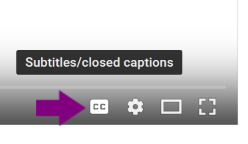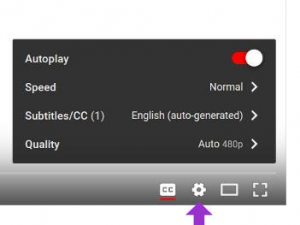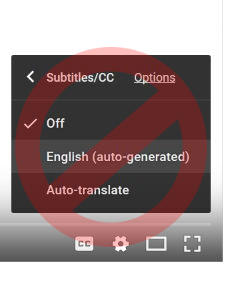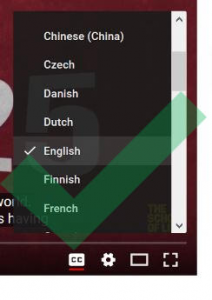MAKING PROGRAMS ACCESSIBLE
The Americans with Disabilities Act (ADA) is a comprehensive national mandate designed to eliminate discrimination against individuals with disabilities. The ADA defines disability as a physical or mental impairment that substantially limits one or more major life activities, such as walking, seeing, breathing, working and learning. Examples include mobility, visual, and hearing impairments, epilepsy, muscular dystrophy, cancer, heart disease, diabetes, psychological disorders, learning disabilities, ADHD and Autism Spectrum Disorders.
Programs are required to address the highly individualized needs of people with disabilities. Since there is no single all-encompassing description of a person with a disability, programs must address access needs on an individual basis. Listed below are suggestions to improve access for people with various types and degrees of disabilities.
- Include a general statement in all of your publications and announcements communicating to people with disabilities that they are welcome to your program. The statement may read “Access provided for people with disabilities. Call (person or office) by (date) for specific requests.”
- For persons with limited or no vision, offer printed materials in alternative formats, such as large print, Braille, audio, or electronic versions.
- Communicate the availability of Assistive Listening Devices (ALD) for people attending your programs. One common ALD, the FM system, is a small transmitter that amplifies the speech of the speaker while eliminating background noise. Call the Disability Resource Center to get information about reserving or purchasing an FM system if one of your program participants requests one.
- Advertise that a sign language interpreter is available upon request to provide access to people who are Deaf. Call the DRC to schedule the services of a staff interpreter for academic classes. For other events, call the DRC to receive information on locating a qualified freelance interpreter.
- Use captioned media when presenting videos. Captioning provides access to videos by displaying auditory information in printed form on the screen, giving participants who are Deaf or hard of hearing equal access.
- Relocate programs that are architecturally inaccessible. Contact Campus Reservations at (706) 583-8023 or at reserve@uga.edu for assistance in finding an alternate location.
- Secure accessible transportation for programs that use University vehicles. Contact the Automotive Center at (706) 542-7525 for assistance.
What is the ADA?
The Americans with Disabilities Act (ADA) is a comprehensive national mandate designed to eliminate discrimination against individuals with disabilities.
Are All Buildings Required to be Accessible?
All buildings do not have to be accessible. Existing facilities should be evaluated to determine the structural changes required to provide access. If feasible, these changes should be made. The ADA requires that all new facilities be designed according to the ADA accessibility guidelines
Program Access
Although a building is inaccessible, UGA departments must ensure that people with disabilities are not excluded from services, programs and activities. Listed below are suggestions to improve what the ADA refers to as “program accessibility” for people who use wheelchairs or have other mobility limitations.
- Advertise in all publications and announcements that you provide programmatic access to your programs for people with limited mobility. Provide the name of a contact person and telephone number for obtaining information about access. A general access statement communicates to people with disabilities that they are welcome to participate in your program. The statement may read “Alternative access will be arranged for people with limited mobility. Call (person or office) by (date) for specific requests.”
- Equip the accessible floor with a campus phone for the person to use to call offices located on inaccessible floors. Check existing and newly installed phones to determine that they are the appropriate height. Include the location of the phone on the building directory. Post phone numbers of offices located on inaccessible floors.
- Provide signs to direct people where to obtain services or get the information they want from programs.
- Internal signs: for buildings with only one accessible floor. Provide accessibility information about your program on existing building directories. If your building does not have a directory, request one through the Disability Resource Center.
- External signs: for buildings with no access. Provide outside signs either directing people to an outside phone line or an accessible building where they can obtain the information they need. The phone line would automatically ring in a designated office in the inaccessible building. A representative from that building would then meet the person at an accessible location.
- Network with offices on the first floor of your building and with offices in accessible buildings in the vicinity to arrange for an accessible meeting room with privacy.
- Forward requests for modest renovation projects (signs, curb cuts, door handles) to Erin Benson, Disability Resource Center, 114 Clark Howell Hall.
- Communicate to faculty and staff in your department that it is the law and their responsibility to provide equal access to all people even if it poses an inconvenience to them.
- Contact Wendy Moore or Lesia Woodall of the Registrar’s Office at 706-542-4040 or at classrooms@uga.edu for Academic Scheduling. Campus Reservations can provide assistance in finding an alternate location for events that are not related to an academic course and can be reached at 706-583-8020 or at reservations@uga.edu.
- Provide access to all departmental information and resources e.g., books, bulletin board notices. This may entail sending a catalog of resources to patrons.
For more information contact:
Disability Resource Center
The University of Georgia
114 Clark Howell Hall
Athens, Georgia 30602-3338
(706) 542-8719 (voice)
(706) 542-7719 (fax)
(706) 542-8778 (tty)
Accessibility and Testing does not encourage research involving students served through this department. However, should a research project be requested, the following procedures apply.
- At least six weeks prior to intended commencement of a research activity the researcher(s) must submit the following to the Director of Accessibility and Testing.
- Five (5) copies of the research proposal. This proposal must include a full description of the methodology of the research, the precise amount of student time required for participation, the method by which student confidentiality and/or anonymity will be ensured, method of compensation, and other information that would be pertinent to full disclosure to potentially interested students.
- One (1) copy of the Institutional Review Board (IRB) application. The IRB application forms and detailed instructions can be obtained from the Office of the Vice President for Research, Institutional Review Board [Human Subjects], Graduate Studies Research Center, UGA.
- Any or all documentation supporting the research proposal.
- Any documents, letters, flyers, etc. that would ultimately be used for the recruitment of student research participants.
- Accessibility and Testing will assemble the Accessibility and Testing student issues committee to review the request for student participants who are registered with Accessibility and Testing. The committee is comprised of the Accessibility and Testing Director and three members of Accessibility and Testing professional staff.
The student issues committee will carefully consider the IRB application, research proposal, supporting documentation, and recruitment literature. Questions regarding the proposal will be directed back to the researcher(s). The committee will grant or deny the request within three (3) business weeks from the date of receipt of the proposal. The committee reserves the right to grant approval pending stipulations and/or suggestions of reasonable modifications it feels are necessary for the welfare of student participants.
The student issues committee’s responsibilities are to ensure students’ rights to privacy, guard against excessive use of Accessibility and Testing data, and to ensure that research efforts will not be disruptive to the educational process of students with disabilities.
- If approval is granted by the Accessibility and Testing student issues committee, the researcher(s) may then proceed to submit the IRB application form to the IRB. Researcher(s) must follow all IRB policies and procedures. Accessibility and Testing approval does not guarantee IRB approval.
- If IRB approval is granted, the researcher(s) must submit a copy of the IRB, Human Subjects, approval letter to the Accessibility and Testing student issues committee.
- Accessibility and Testing agrees to mail the approved researcher(s) recruitment materials to all the Accessibility and Testing students who meet the requirements of the research proposal. The researcher(s) must agree to underwrite the cost of postage for the mailing on their behalf.
- Once recruitment materials have been mailed, it will then be the decision of each individual student whether or not to contact the researcher(s) for inclusion in the study. In order to preserve the confidentiality of the Accessibility and Testing students, at no time will the Accessibility and Testing staff provide the researchers with the names or other identifying information about any students served by Accessibility and Testing.
- Once the study is underway, it is the responsibility of the researcher(s) to notify the Accessibility and Testing student issues committee when data collection ceases, when any protocol changes take place, or when any problem is encountered that may adversely affect a participant or participants.
3 Steps to Captioning Your Classroom Media
This guide focuses on captioning material that is produced off of the UGA Campus. If you are producing your own material (recording your lectures and posting them for later viewing, etc.) captioning is an integral part of the process. Accessibility and Testing is more than willing to provide guidance and highlight resources, but the responsibility to caption content produced by professors on campus is that of their respective department. If you are curious about the details behind this campus-wide commitment, please reference UGA’s Electronic & Information Technology Accessibility policy here.
Step 1.
Take a close look at your planned course material for this upcoming semester. Make a note of anything that qualifies as video or audio (full-length movies, YouTube clips, podcasts, etc.).
Step 2.
Determine if captioned versions already exist of your chosen media. That full-length movie you were planning on showing might have captions available on the DVD. Also, you can search for captioned versions of videos on YouTube by adding a comma and “cc” after the title of the video in the search bar (e.g., “poverty in america, cc”). It is also common for the source website, such as msnbc.com or ted.com, to have captioned versions of their material available.
*YouTube Caption Disclaimer*
If you are planning on showing a YouTube video and it shows the “CC” logo in the bottom, that does not necessarily mean it’s captioned.
To check, click the CC button and then click the small gear right next to it.


Click on “Subtitles/CC” – if the only options are “English (auto-generated)” or “Auto-translate,” it’s not captioned. A great example of just how inaccessible Auto-Generated captions can be found in this video produced by McMaster University.

If you see an option simply labeled “English,” select it, and yes, it is captioned.

Step 3.
If needed, reach out to us! The Captioned Media Office specializes in captioning various types of content for classroom use. If you cannot find a captioned version of the topic you are interested in, Accessibility and Testing can add captions to many types of media produced off campus such as DVDs, online videos, digital videos, and VHS. If you have content that was produced off-campus, please submit a list of your materials (website links, names of movies, etc.), including the planned date to be used in class, to ccap@uga.edu. Please note that it may take up to two to three weeks to caption a full-length feature.
We here at the Accessibility and Testing Captioned Media Office are happy to have you aligned with The University of Georgia’s commitment to providing equal access to information and communication technology to all, including those with disabilities, by ensuring that your video material is captioned. Don’t hesitate to send us an email if you have any questions not addressed in this guide.
Contact Accessibility and Testing
Clark Howell Hall
825 South Lumpkin Street
Athens, GA 30602
Monday – Friday
8:00 am – 5:00 pm
706-542-8719
Amanda Hales, Senior Accommodations Coordinator
